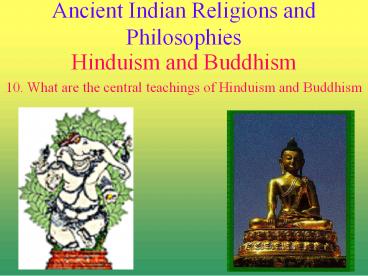Ancient Indian Religions and Philosophies - PowerPoint PPT Presentation
1 / 20
Title:
Ancient Indian Religions and Philosophies
Description:
Ancient Indian Religions and Philosophies Hinduism and Buddhism 10. What are the central teachings of Hinduism and Buddhism Hinduism Basics Hinduism is the world s ... – PowerPoint PPT presentation
Number of Views:468
Avg rating:3.0/5.0
Title: Ancient Indian Religions and Philosophies
1
Ancient Indian Religions and Philosophies
- Hinduism and Buddhism
- 10. What are the central teachings of Hinduism
and Buddhism
2
Hinduism Basics
- Hinduism is the worlds third largest religion.
16 of the world, or 900 million people are
Hindu. - It has no individual founder -- It is believed to
be a combination of Indus Valley, Aryan and
Dravidian beliefs. - Elements of this religion date back 6,000 years.
3
Hindus believe the entire universe is seen as one
divine entity a God who is simultaneously at
one with the universe and who transcends it as
well. This entitys name is Brahman.
4
But most people have trouble with this
concept.So Brahman has been divided into over
33,000 other gods.
5
The three most important gods
? Brahma, the creator
? Vishnu, the Preserver
? Shiva, the destroyer
6
Hindu goal of life
- To unite with Brahman and achieve moksha through
the cycle of reincarnation, also known as samsara
7
To break the reincarnation cycle and achieve
moksha you must
- Do your dharma -- the duty assigned to you based
on your age, gender, caste, etc. (literally means
righteousness) - Achieve good karma -- the accumulated sum of all
your good and bad deeds. (think of it as credit
for the next life) - Be reborn as a higher and higher being.
- Achieve enlightenment.
8
To achieve enlightenment, you must
- Think pure thoughts
- Act wisely
- Treat all life with respect
- Practice ahimsa -- nonviolence
9
The Caste System Four main castes
- Brahmins--the priests and academics
- Kshatriyas--rulers, military
- Vaishyas--farmers, landlords, and merchants
- Sudras--peasants, servants, and workers in
non-polluting jobs.
10
Plus the outcastes or untouchables-- the
lowest of the low. They are responsible for the
jobs that no one else can do, like preparing the
dead, cleaning sewers, etc. No one else can
touch them.
11
Main Hindu Texts
- The Vedas -- four texts of hymns and writings.
The oldest is the Rig Veda - The Upanishads -- a collection of dialogues
between teacher and student about the nature of
gods and the self - Epics like the Ramayana, the Mahabharata, and the
Bhagavad Gita
12
Buddhism Basics
- Buddhists make up 6 of the worlds population or
350 million people. - It was founded by Siddhartha Gautama who later
became The Buddha or Enlightened One. - Some people consider it a religion and some
consider it a philosophy.
13
The Middle Way
- If you tighten the string too much, it will
snap. If you leave it too slack, it wont play.
14
The Four Noble Truths
- All Life is Suffering
- The Cause of Suffering is the desire for things
- The only cure for Suffering is to overcome desire
- The way to overcome desire is through the
eightfold path
15
The Eightfold Path
- Right livelihood
- Right effort
- Right mindset
- Right contemplation
- Right views
- Right aspirations
- Right speech
- Right conduct
16
Buddhist goal of life
To unite with the universe and achieve nirvana
through the cycle of reincarnation.
17
Main Buddhist Texts
- Tripitaka- three breadbaskets of wisdom
- Tibetan Book of the Dead
- Mahayana Sutras
18
There are many similarities between Buddhism and
Hinduism
- Ultimate goal of both is to break the cycle of
reincarnation - Both believe in dharma and karma
- Both are committed to ahimsa -- nonviolence
- Strive in both to achieve enlightenment
- Neither requires worship in a temple
19
But there are also many differences
- No gods in Buddhism
- No caste system in Buddhism
- Anyone can achieve enlightenment in Buddhism
20
- HW 10 Read 72-76 Outline































